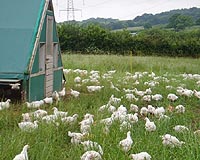 |
Rome (UPI) Jul 20, 2009 Good cereal harvests and a sharp decline in international grain prices have not had any impact on domestic food prices in developing countries, which remain very high and are a major source of hardship for millions, the U.N. Food and Agriculture Organization said Monday. Erwin Northoff, FAO spokesman, told United Press International the organization remained optimistic the next World Food Summit in November would reach a much needed broad consensus on issues affecting global food security. The FAO's Crop Prospects and Food Situation report, released last week, outlined and detailed the full extent of the developing crisis, with more than 1 billion suffering daily from various degrees of hunger. The summit, to be held at FAO headquarters in Rome Nov. 16-18, will aim for international consensus on ways to eradicate hunger, improve governance in the international agricultural system and frame policies and programs that ensure world food security, according to the U.N. organization. The conference will be attended by heads of states and governments from both food aid donor and recipient countries, Northoff said. It follows on The Joint Statement on Global Food Security issued July 10 at the G8 Summit in the Italian town of L'Aquila. Although Africa and Asia are the worst hit -- 20 African and 10 Asian countries are on an FAO crisis list -- the lack of rain in Argentina and concern over lower winter wheat yields in the United States and Canada clouded outlook in the Western Hemisphere, the report showed. In sub-Saharan Africa, 80 percent to 90 percent of all cereal prices monitored by the FAO in 27 countries remain more than 25 percent higher than before the soaring food price crisis two years ago. In Asia, Latin America and the Caribbean, 40 percent to 80 percent of food prices in 31 countries remain more than 25 percent higher than in the pre-food-crisis period. "The high food price situation continues to give rise to concern for the food security of vulnerable populations in both urban and rural areas, as these groups spend a large share of their incomes on food," the FAO said. Among the reasons for high food prices, the report cited reduced harvests, higher or delayed imports, civil conflict, strong demand in neighboring countries and regional trade flows, devaluation of national currencies, changes in food and trade policies, increased incomes and demand, and poor or more expensive transport. The FAO said despite the high prices the outlook for world cereal supply and demand was satisfactory, even as world cereal production dropped 3 percent in 2009 from the 2008 record level. In Eastern Africa, an estimated 19.8 million people are in need of emergency food and agricultural assistance. In Zimbabwe, some 2.8 million require food aid. In Far East Asia, millions of people continue to face serious food insecurity due to conflict, civil strife, below-average harvests or cyclones. The food situation of more than 6 million people in North Korea is expected to worsen because of reductions in food aid deliveries, the FAO said. The African countries on the FAO crisis list are: Burundi, Central African Republic, Chad, Congo, Côte d'Ivoire, Democratic Republic of Congo, Eritrea, Ethiopia, Guinea, Guinea-Bissau, Kenya, Mauritania, Lesotho, Liberia, Sierra Leone, Somalia, Sudan, Swaziland, Uganda and Zimbabwe, High on the Asian list are Afghanistan, North Korea, Bangladesh, Iran, Myanmar, Nepal, Pakistan, Sri Lanka and Timor-Leste. The FAO report also identified countries with unfavorable crop prospects and potential food security risks, including Nigeria, India, Moldova and Argentina. Share This Article With Planet Earth
Related Links Farming Today - Suppliers and Technology
 China ups ante in US WTO dispute over poultry
China ups ante in US WTO dispute over poultryGeneva (AFP) July 20, 2009 China on Monday upped the ante in a dispute with Washington over poultry exports, calling on the World Trade Organisation to rule on its complaint against US "discriminatory" legislation. According to Beijing, Washington is breaching international trade rules through a US spending bill that it says contains a clause banning imports of Chinese poultry. "While violating various WTO rules ... read more |
|
| The content herein, unless otherwise known to be public domain, are Copyright 1995-2009 - SpaceDaily. AFP and UPI Wire Stories are copyright Agence France-Presse and United Press International. ESA Portal Reports are copyright European Space Agency. All NASA sourced material is public domain. Additional copyrights may apply in whole or part to other bona fide parties. Advertising does not imply endorsement,agreement or approval of any opinions, statements or information provided by SpaceDaily on any Web page published or hosted by SpaceDaily. Privacy Statement |